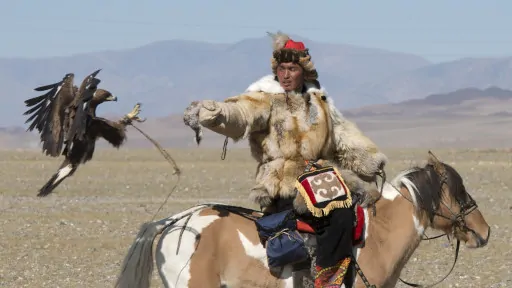Opinion Editorial Archive October, 2021: Flying for Me

On the same day that the Space Shuttle Challenger exploded in 1986, John Denver began writing his tribute song "Flying for Me." Even if you already knew that, you may not know the full back story. At one time, there was a chance that he would have been aboard the Challenger that day. He was an early, vocal advocate for civilian spaceflight long before anyone used the term 'space tourism.' He had applied to enter the civilian spaceflight program. He had also met in person all seven astronauts who died that day.
I was reminded of his tribute song when I took this month's photo. In the same sense that Denver intended the lyric, this golden eagle was flying for me.
Had the Challenger mission (formally designated STS-51-L) been successful, Christa McAuliffe would have entered history as the first private civilian in space. Only last month did we truly understand why Denver sang of her that she was "flying for everyone." One of the four astronauts (yes, they deserve that title) who became the first all-civilian crew in orbit last month, Hayley Arceneaux, wasn't born at the time of the Challenger disaster. Yet Christa McAuliffe and thousands of others throughout history played a part in making the Inspiration4 mission possible.
If we take the concept of flying literally, then although none of us was born when the Wright brothers achieved the first powered flight, they were flying for those who now fly. If we take the concept of flying figuratively, then any pioneering event in history takes on the same significance.
So, when it was reported last month that scientists now believe that indigenous people first reached the Americas seven thousand years before previously thought, it doesn't matter so much whether they are correct. What does matter is that those early pioneers were flying for everyone. Similarly, while we learned last month in greater detail than before how indigenous Polynesians first populated Pacific islands, we already knew that thousands later benefitted from their pioneering voyages. A third news story from last month informed us that humans were making clothes as long as 120,000 year ago. But we don't need to know that date to enjoy the benefits of their efforts every day.
Understanding the roles of those who came before us is not essential. Yet that understanding affords us a clearer window into our past. This is one reason why ancestor veneration is so prevalent in indigenous culture.
Understanding the roles of our contemporaries in addressing problems we all face is essential. This was brought to prominence last month when Global Witness reported that a record of (at least) 227 environmental activists were murdered in 2020 — many of them indigenous land defenders. They were pioneers also; all pioneering efforts result in some casualties.
Unlike the Inspiration4 astronauts, I will never orbit the Earth. But that doesn't matter. None of us was born when golden eagles were first domesticated. Scientists may one day be able to tell when that happened with greater accuracy than they can today. That won't change the fact that before I took this photo I would have been scared to handle a golden eagle. A few days later I was handling golden eagles with confidence.
Christa McAuliffe, Hayley Arceneaux and millions before them were, in a very real sense, flying for me and for everyone.
If you enjoyed reading this month's opinion editorial, please consider supporting independent, advertising-free journalism by buying us a coffee to help us cover the cost of hosting our web site. Please click on the link or scan the QR code. Thanks!

